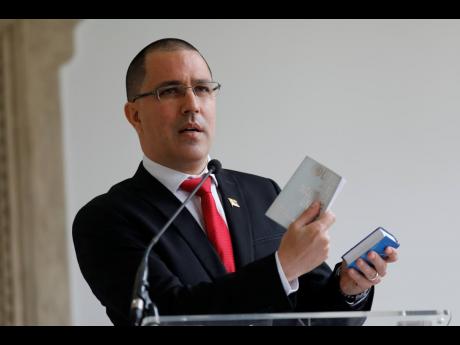Sanctions prompt expulsion of head of EU delegation
CARACAS, (AP):
Venezuela’s government on Wednesday ordered the expulsion of the head of the European Union delegation in the South American nation following the bloc’s decision to impose sanctions on several Venezuelan officials accused of undermining democracy or violating human rights.
Isabel Brilhante Pedrosa was given 72 hours to leave the troubled country. Venezuelan Foreign Minister Jorge Arreaza said Brilhante Pedrosa was declared persona non grata by decision of President Nicolás Maduro
“The circumstances of aggression leave no option” due to “disrespect for public international law” and in accordance with the Vienna Convention on diplomatic relations, Arreaza said in a statement after a meeting with the European diplomat in the capital of Caracas.
“We do it because there are already 55 decisions, of what they call sanctions in the European Union or in the US system, as if they had a moral authority, which they do not have, nor legal, to impose any punishments on citizens of any other country,” Arreaza said.
The move from the Venezuelan government came two days after the European Union’s foreign ministers sanctioned 19 Venezuelan officials, freezing their assets and banning them from travelling to the bloc, citing the deteriorating situation Venezuela faces after the December 2020 elections. The main opposition parties boycotted those elections.
So far, 55 Venezuelan officials have been sanctioned by the European Union.
“The individuals added to the list are mainly responsible for undermining the electoral rights of the oppositions and the democratic functioning of the National Assembly and for serious violations of human rights and restrictions on fundamental freedoms,” the EU ministers pointed out.
It is the second time in almost eight months that Brilhante Pedrosa has been declared persona non grata and ordered to leave Venezuela. The measures both times have been related to the sanctions imposed by the European bloc against officials and allies of Maduro.
Last June, Brilhante Pedrosa was able to remain in Venezuela after the European Union High Representative for Foreign Affairs, Josep Borrell, and Arreaza agreed on the need to maintain a framework of diplomatic relations at a time when the parties “can facilitate the paths of political dialogue”.
Arreaza on Wednesday lamented that the sanctions were imposed again after “last year it was possible to establish stable communication with the High Representative for Foreign Relations of the European Union”.
“President Maduro was generous when he allowed the heads of missions to remain in Venezuela, and even the missions of European Union countries, when in February 2019 they ignored him” as the legitimate president of Venezuela, Arreaza said Wednesday in reference to the recognition then given to opposition leader Juan Guaidó.
Guaidó, former president of the National Assembly, declared himself interim president in 2019 and was recognised by 60 countries as the legitimate leader of Venezuela instead of Maduro, arguing that his re-election in 2018 was fraudulent. Among the countries that recognised Guaidó as acting president at the time were Spain, France, the United Kingdom and Germany.
Maduro has repeatedly said that he is attacked by the European bloc and the United States to force him to leave power.
Venezuela is mired in a deep political, social and economic crisis attributed to two decades of socialist governments that have left the once-rich oil country bankrupt. Venezuela has been in recession for years. Millions live in poverty amid high food prices, low wages and four-digit inflation.


